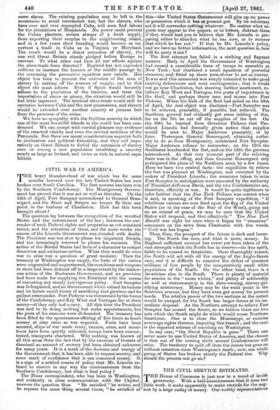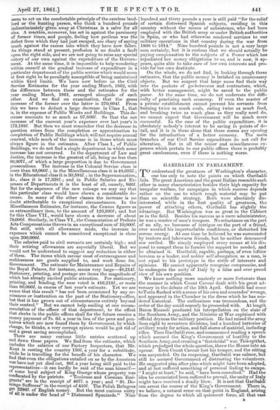THE CIVIL SERVICE ESTIMATES.
THE Rouse of Commons is just now in a mood of lavish generosity. With a half-consciousness that it does but little work, it seeks apparently to make amends for the neg- lect by a large outlay of money. Our worthy representatives seem to act on the comfortable principle of the careless land- lord or the hunting parson, who think a hundred pounds indiscriminately given away at Christmas is a salve for all sins. A reaction, moreover, has set in against the parsimony of former times, and people, feeling how perilous was the defect from which they had just escaped, are chary of saying much against the excess into which they have now fallen. As things stand at present, profusion is no doubt a fault upon the right side, and we are not going to raise anv special outcry of our own against the expenditure of the *Govern- ment. At the same time, it is impossible to help wondering within oneself at the gradual increase of expenditure in a particular department of the public service which would seem at first sight to be peculiarly susceptible of being maintained within fixed limits. We have now before us the Civil Service Estimates for the year ending March, 1862, with the difference between these and the estimates for the year ending March, 1861, arranged alongside of each other. And we find on examination, that the gross increase of the former over the latter is 270,9941. From this we have to deduct a large decrease in Class I., that is, in the expense of Public Works and Buildings. This de- crease amounts to as much as 97,8061. So that the net increase of the current year's expenses over last year's is 173,1881. But then we must remember that the decrease in question arises from the completion or approximation to completion of Public Buildings which will not require annual renewal, while much of the increase is in items which must always figure in the estimates. After Class I., of Public Buildings, we do not find a single department in which some increase has not occurred. In the department of Law and Justice, the increase is the greatest of all, being no less than 90,3071., of which a large proportion is due to Government prosecutions. The increase in the Colonial Service class is more than 83,000/. ; in the Miscellaneous class it is 48,6951.; in the Educational class it is 30,5841. ; in the Superannuation, &c., class it is 17,3281. ; and in Public- Salaries and Ex- penses of Departments it is the least of all, namely, 8661. But for the expenses of the new coinage we may say that this particular class would have shown a considerable de- crease. In many of the other classes the increase is no doubt attributable to exceptional circumstances. In the Miscellaneous Estimates, for instance, the Census figures as an extraordinary item, to the amount of 126,9301; and but for this Class VII., would have shown a decrease of about 78,0001. Similarly, in Class VI., the Commutation of Probate Acts Compensations throws in an exceptional sum of 10,0001. But still, with all allowances made, the increase in expenses which cannot be considered exceptional is close upon 200,0001.
The salaries paid to civil servants are certainly high ; and their retiring allowances are especially liberal. But we 'would not be understood to suggest any reduction in either of them. The items which savour most of extravagance and recklessness are goods supplied to, and work done for, Government. The estimate for Maintenance and Repairs of the Royal Palaces, for instance, seems very large-48,2141. Stationery, printing, and postage are items the magnitude of which has already excited public attention. For stationery, printing, and binding, the sum voted is 416,2181., or more than 80,0001. in excess of last year's estimate. Yet we are aware that this result " has not been occasioned by any re- missness or inattention on the part of the Stationery-office, but that it has grown out of circumstances entirely beyond their control." But we cannot help smiling at one recom- mendation of the officer of that department, to the effect that clerks in the public offices shall for the future receive a money payment of 7s. 6d. a year in lieu of the pens and pen- knives which are now found them by Government, by which change, he thinks, a very corrupt system would be got rid of and a great saving accomplished. There are many curious little entries scattered up and down these papers. We find from the estimate, which includes the salaries of our Factory Inspectors, that Mr. Kent is costing the country 1501. a year for a substitute, while he is travelling for the benefit of his character. We find that even the obligations entailed on us by the American war have not yet died out, 901. a year being still paid to the representatives—it can hardly be said of the man himself— of some loyal subject of King George whose property was confiscated by the patriots. " Toulouse and Corsican Emi- grants" are in the receipt of 407/. a year ; and " St. Do- mingo Sufferers" in the receipt of 4101. The Polish Refugees get 22801. of English money. But the most curious entry of all is under the head of " Distressed Spaniards." Nine
•
hundred and thirty pounds a year is still paid "for the relief of certain distressed Spanish subjects, residing in this country without the means of subsistence, who had been employed with the British army or under British authorities in I:pain, or who had otherwise rendered services to our military operations in that country during the war from 1808 to 1814." Nine hundred pounds is not a very large sum certainly, but it is curious that we should actually be paying compensation to the subjects of a Power which has repudiated her money obligations to us, and is now, it ap- pears, quite able to take care of her own interests and pro- vide for her own destitute.
On the whole, we do not find, in looking through these estimates, that the public money is lavished on unnecessary objects. But we suspect that large sums find their way into the pockets of go-betweens and contractors, which, with better management, might be saved to the public purse. At the same time, we do not underrate the diffi- culty of practising such economy. If even the master of a private establishment cannot prevent his servants from burning twice as much coals, eating twice as much food, and breaking twice as much glass as they really need do, we cannot expect that Government will be much more successful. In the case of the public expenditure, it is absolutely nobody's interest to be saving in points of de- tail, and it is in these alone that there seems any opening for the introduction of a better economy. The main branches of our Civil Service expenditure do not call for alteration. But in all the minor and miscellaneous ex- penses which pertain to our public offices there is probably great carelessness, even if there is nothing worse.
•































 Previous page
Previous page